Despite being a natural rite of passage, menstruation continues to be taboo in society. It’s talked about in jest and in complaint … and we get it. It’s something personal and can be awkward or annoying, but one thing we hope it never is: shameful.
Today is International Women’s Day. It’s a day to acknowledge the need for equality in the workplace, a day to encourage women to wholeheartedly pursue their ambitions and for all to adopt a more inclusive outlook, recognizing the unconscious gender biases we might have. How do periods fit into this? Simple. In many parts of the world, the inability to easily or healthily deal with her monthly period means a girl misses out on school, therefore, also the opportunities that education affords her.
Julie Weigaard Kjaer, co-founder of Ruby Cup, is trying to change that. She’s advocating for social change through a conversation change on our monthly flow and we’re ready to join in. Below, she’s sharing how menstrual cups won’t just revolutionize your own routine, but how they’re key to so many women reclaiming dignity and the ability to chase their dreams across the globe — the heart of what this day (and every day!) is all about.
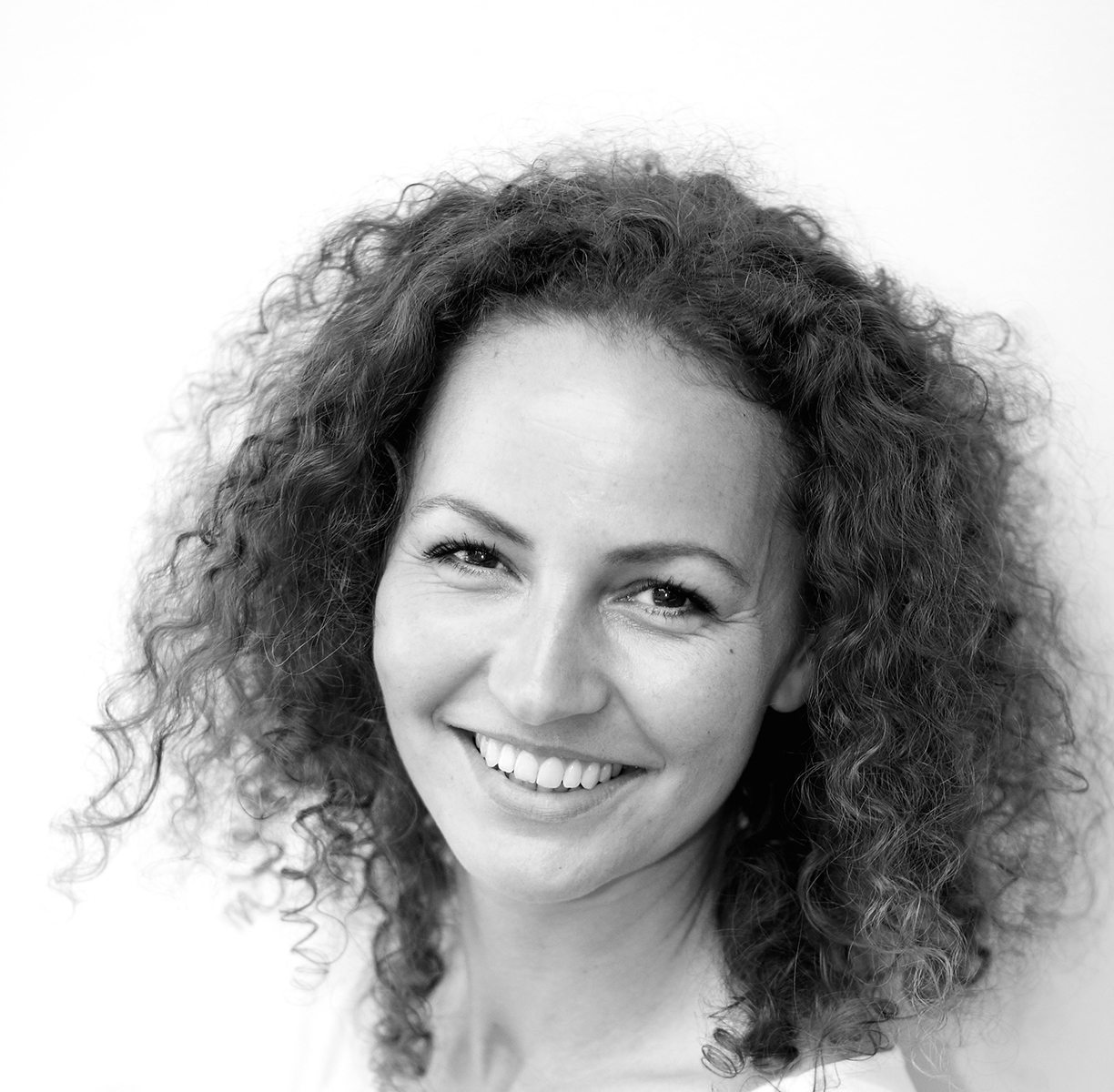
Darling Magazine: Tell us about the Ruby Cup. What led to the idea for such an organization?
Julie: One of my co-founders was already using a menstrual cup and introduced it to me. It was an eye-opener, I didn’t know about its existence, had always used tampons and never thought about that there might be other solutions out there. The menstrual cup was a life-changer for me in dealing with periods; it made me feel so much better and healthier.
At that time, we were in university learning sustainable business strategies and how to create social change through business. The menstrual cup led us to menstruation research and we discovered how ignorant we were to the significant obstacles menstruation poses for girls and women in low-income communities across the world. Millions do not have access to menstrual products and simply can’t afford to buy pads or tampons every month.
We also found that menstruation is subject to taboo in these communities and a girl often finds herself in the situation of starting her period having no idea what’s happening to her. Imagine the fear and the shame associated with leaking and staining your clothes. Many girls try to hide it as best they can and end up staying home from school. In many cases this leads to dropping out of school entirely. It’s a huge obstacle to gender equality, just because they have periods, girls miss out on education vs. boys. Creating Ruby Cup was a no-brainer for us! It’s healthy, reusable and coupled with the right education, it can give a girl a dignified and sustainable way to handle her period.
Imagine the fear and the shame associated with leaking and staining your clothes. Many girls try to hide it as best they can and end up staying home from school. In many cases this leads to dropping out of school entirely.
DM: In developing countries in particular, why are menstruation cups so life-changing?
Julie: Research shows that 1 in 10 girls in Africa miss days of school during their period. This can amount to 20% of every school year. Another scary fact is the numerous cases of girls having transactional sex with older men in exchange for pads. This leads to unwanted pregnancies, STIs, school dropout and this vicious circle goes on and on.
So, a menstrual cup is literally life-changing because if a girl has one, and also has adequate knowledge about her period and body, she can potentially break the vicious circle and stand a better chance in life. The long-term effect is closing gender gaps; it’s no news that that benefits society overall, not just girls and women.
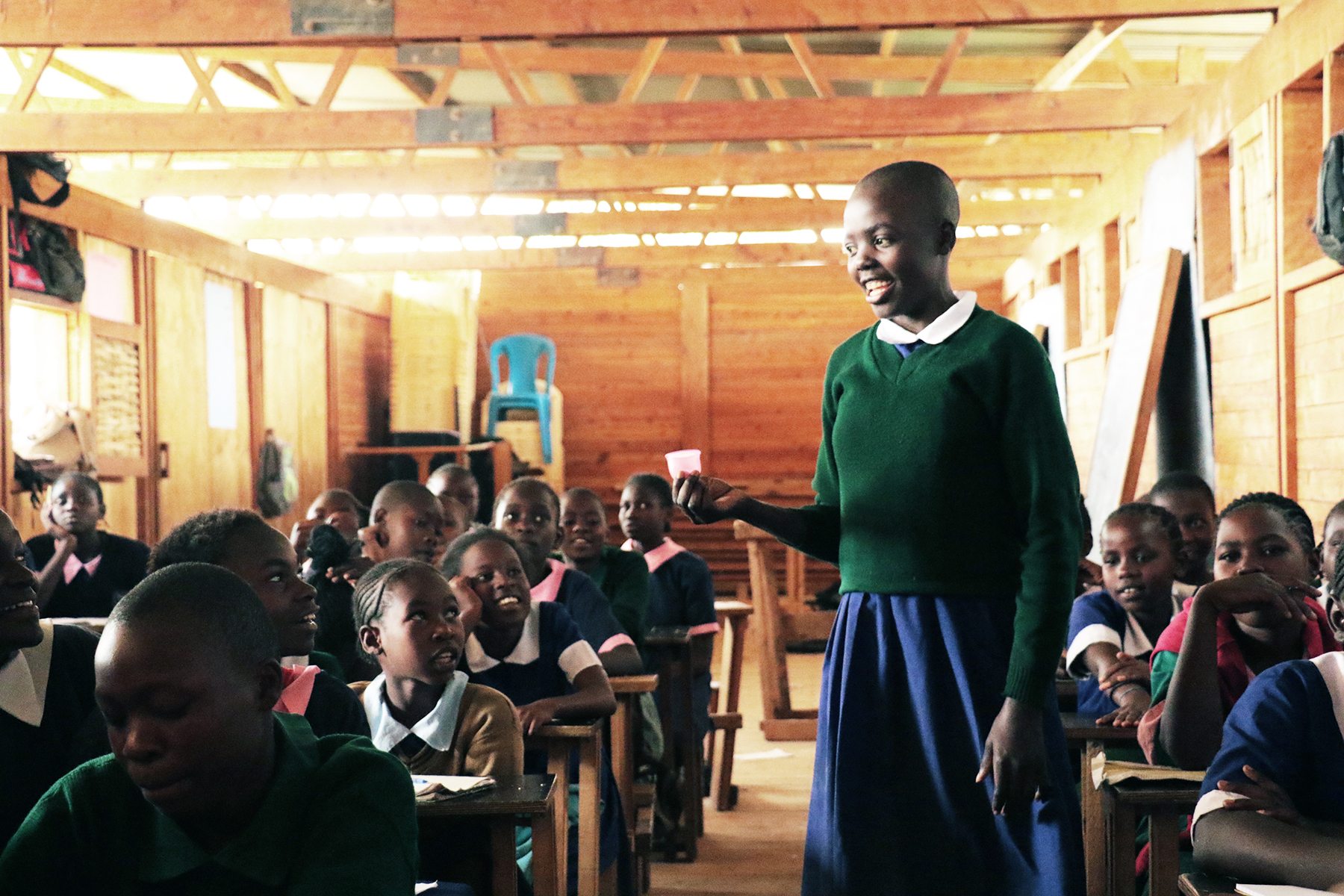
DM: How are you able to measure Ruby Cup’s success?
Julie: Currently, we measure adoption rate after three and six months to find out how many of the girls are still using the cup. We have found that with the adequate education and follow-ups in place, 8 out of 10 girls are still using the cup. Apart from that, we ask questions on school performance and general feedback on how they feel. This is overwhelmingly positive and we have cases where 80% report to concentrate better in school.
It’s at our core to constantly improve how we collect data and measure success. It’s not a product you can just donate and then walk away. If you do that, then it’s likely only a very small fraction of the receivers will start using it.
Therefore, we never engage in donation programs without sustained support and follow-up on the ground. This requires more resources and money but on the other hand, if we wouldn’t do it, the cups would go to waste. Also, it’s actually a positive side-effect that a cup requires and gives you so much knowledge about your body, because knowledge in itself is so empowering to a girl.
DM: Why do you think it’s so important to break the stigma of menstruation? Where do you think that stigma began in the first place?
Julie: I met a girl in Kenya once, who told me that she had her period for two years before she found out what it was. For two years she thought she was sick and going to die. Imagine the emotional stress every month and then imagine the difference it would have made if she’d had someone to tell her that it was normal and nothing to be ashamed of.
Also, the majority of girls I’ve met think that you cannot get pregnant if you have sex while on your period, because they do not have the right information available. This misconception can have devastating consequences for a girl if she ends up pregnant.
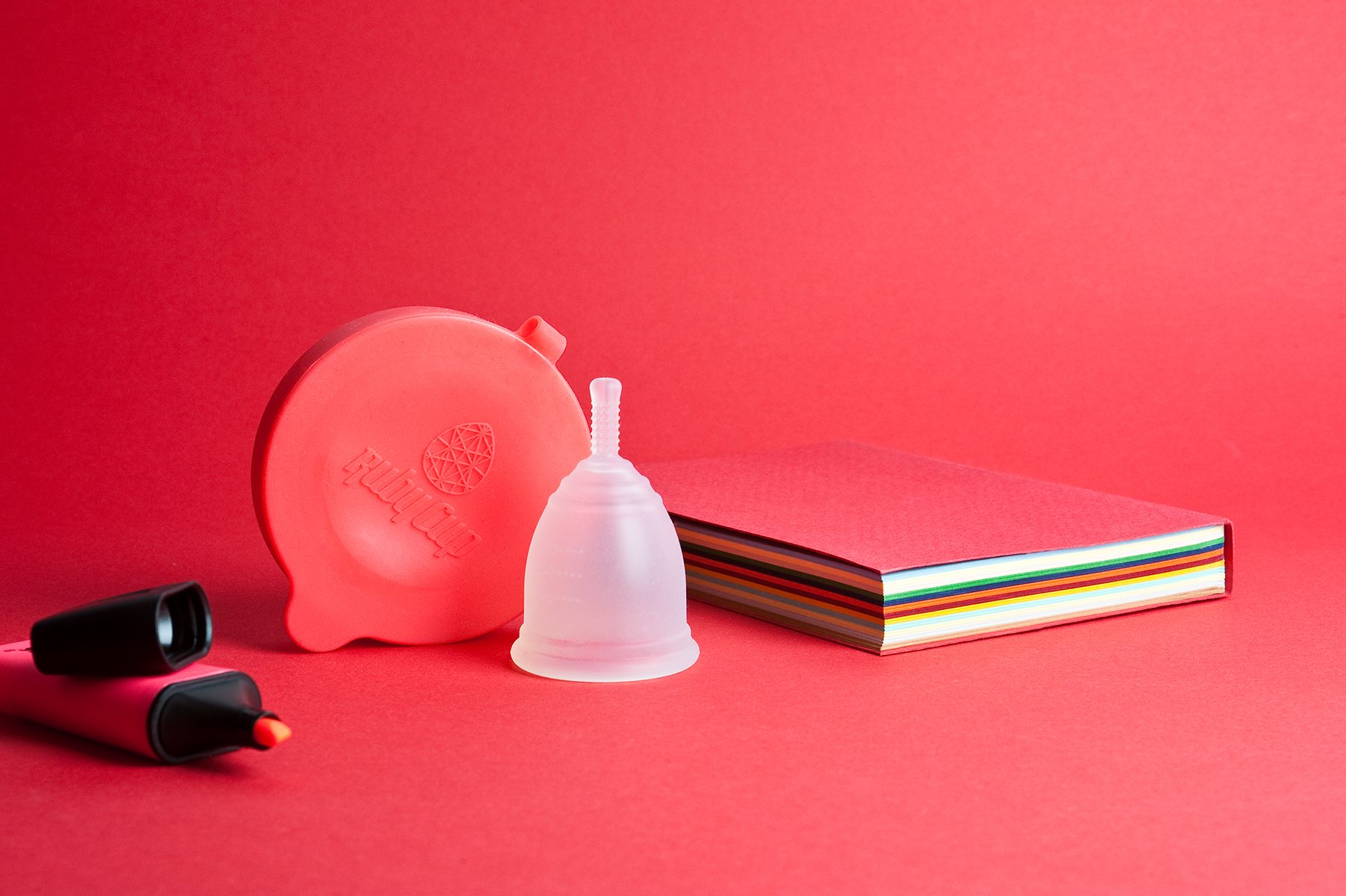
To me, the biggest threat or consequence of stigma is that something is silenced. Silencing very often leads to things getting mystified in ways that can be very harmful to people and sometimes even deadly. In some cultures, menstruation labels a girl as dirty so she can’t cook, can’t work and in some places, she is sent to a menstrual hut during the days of her period. There are cases of young girls dying in these huts because they simply froze to death.
I can’t say how the stigma started, but it seems so deeply rooted in most of our cultures that I’m sure it goes back generations and hundreds, maybe even thousands of years. And it’s hard to ignore that women’s (lack of) rights is part of the reason that the stigma has prevailed for so long, in some places.
DM: What are the advantages of using menstruation cups over other feminine hygiene products?
Julie: When I first started out with the cup, I thought it was a bit complicated and weird. But after a few months of trying it out, that all changed. The cup has such a high capacity that I can go three times longer without interruption, unlike with a tampon. Also, the fact that I don’t feel it, it doesn’t dry me out and there’s not even a string popping out makes all the difference for me. It’s also healthier, eco-friendly and cost-saving.
There’s also this weird, intangible thing about it: I feel more clean. Which leads me to a common misconception or first reaction — that it’s gross because you have to empty and wash it. That would be my one thing to tell those in doubt; the thought of it being gross and weird disappears once you get the hang of it.
DM: What’s the best way for someone to get involved with your organization?
Julie: We are always open for new partnerships and collaborations so shoot us an email or a direct message on Facebook, Instagram or Twitter.
Why do you think there’s a stigma surrounding menstruation? Do you think it can change?
Images via Ruby Cup
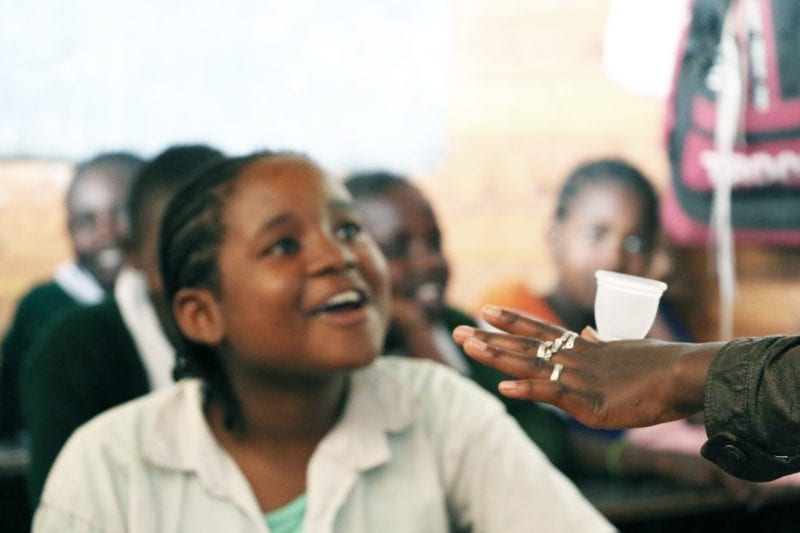
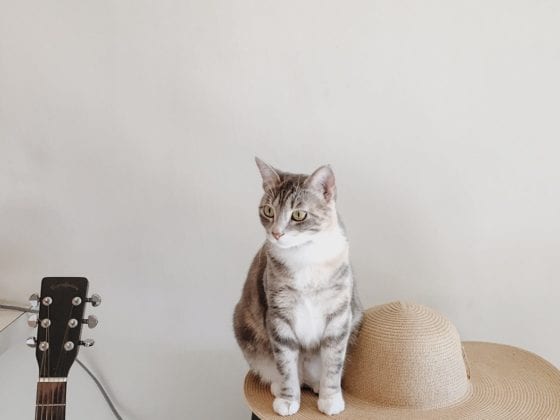


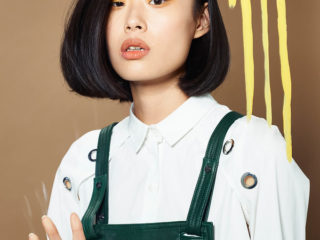
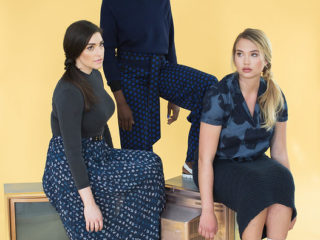
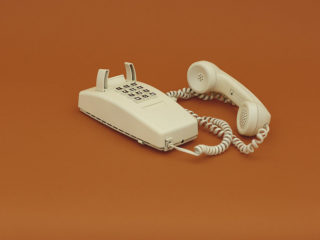




3 comments
I have a ruby cup! I am a few cycles in to the cup world and made the switch after two of my closest friends raved about menstrual cups. The cup can stay in up to 12 hours, which means I don’t have to change anything at work. It also lasts for 10 years. Working in a male dominated field, this has made life so much easier. And, I am thrilled that my purchase allowed a girl in need to receive a ruby cup. Win for all!
The difference this must make to young girls in third world countries must be massive. As someone who lives in South Africa, it is a well-known issue about how difficult education becomes because of periods. It is so fortunate products such as this are making such a difference in young girls’ lives!
Thank you for sharing. The stigma surrounding talking about menstruation isn’t one that crosses my mind much, and I agree it’s still taboo in most countries to talk about it – but it’s definitely getting better and women are starting to speak up a lot more everywhere.
–
Charmaine Ng | Architecture & Lifestyle Blog
http://charmainenyw.com